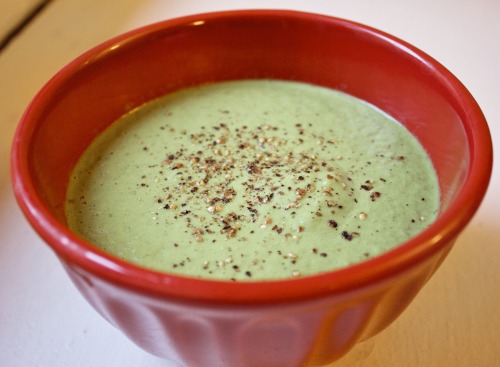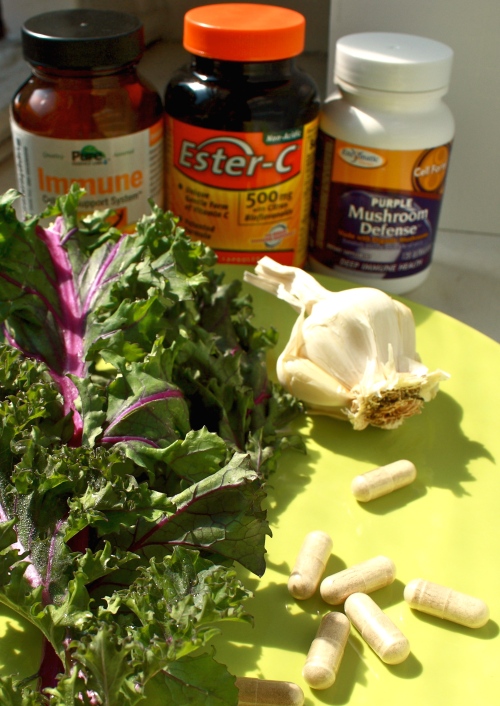The summer is the perfect time for light, cool, refreshing meals. A raw soup, which is completely uncooked, is extraordinarily nutritious and easy to make in your blender. It’s very important to include raw vegetables in your daily diet as they still have all of their natural enzymes and nutrients intact. Heating destroys some of these compounds. I also urge you to buy organic when you can. Your exposure to pesticides will be much greater if you’re eating a lot of non-organic produce.

This is what I call a Creamy Asparagus Soup, but there’s much more than asparagus in here. I don’t follow a specific recipe to make a raw soup; instead I include a wealth of raw vegetables, fresh herbs, and taste it along the way. Here’s a basic outline of what to include.
Template for Raw Soups
– Raw vegetables. I always include a leafy green like kale or swiss chard. After that, try zucchini, cucumber, asparagus, bell peppers, broccoli, or any other raw vegetable. This should be the base of your soup.
– Flavor enhancer. Raw onions and raw garlic both add delicious flavor to soup, but remember that they are much stronger when raw than cooked. Both onions and garlic have powerful anti-inflammatory properties.
– Fresh herbs. Fresh herbs have medicinal properties and will give your soup a distinct flavor. I like basil or cilantro; experiment with your favorite herbs. You’ll want to use a lot if you’re making a large batch of soup. When I fill my blender, I use an entire bunch of basil or cilantro (and sometimes I could use more!) I would stick to no more than two different herbs, or else your soup’s flavor may be too complex.
– Lemon juice. Lemon juice is extremely alkalizing to the body and adds a subtle tang to your soup. Don’t buy bottled lemon juice; buy lemons and squeeze the juice yourself.
– Cream. Okay, not cream exactly, but something that will make your soup creamy. Avocados are a great alkalizing nutrient source and will make your soup creamy. I also like to add raw cashews to make the soup creamier and slightly sweeter. Experiment with other raw nuts and seeds, too.
– Sea Salt and Pepper. A little sea salt is definitely necessary to make your soup palatable. Regular iodized table salt is heavily processed, so opt for sea salt instead. Crushed black pepper adds a nice addition, as does cayenne pepper if you like your soup spicy.
– Water. You need a little liquid to get your soup to the desired consistency. How thick you want your soup is totally up to you. I like a thick, creamy soup.
Some Tips:
1. I use my Vita-Mix, an extremely high-powered blender, to make my soups. The Vita-Mix has no trouble liquifying whole vegetables. If your blender is not so strong, make sure to chop your vegetables into smaller pieces and add enough water. You also may need to process your soup in small batches.
2. Don’t forget to test your soup after adding all the ingredients. See if it’s a good texture, creamy enough, flavorful enough, etc. When making a raw soup, you can keep adding more of a certain ingredient until you’re totally satisfied with the result.
3. The soup keeps well in the fridge for about a week. It may keep longer, but mine has always been finished by then! Just be aware that the soup will thicken slightly after sitting in the fridge.
Try the recipe out, and let me know some of your favorite combinations of ingredients!
-Emily

